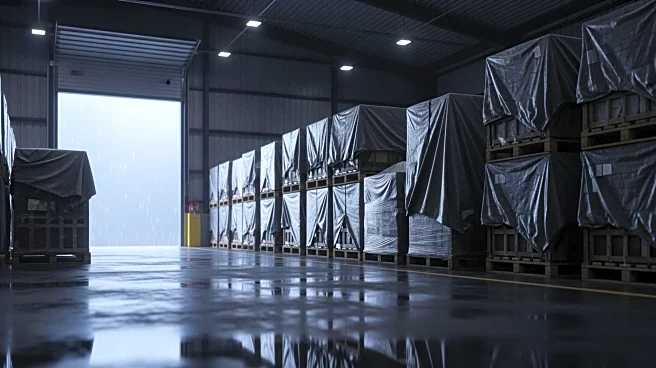What's Happening?
Aid agencies are calling for Israel to permit more tents and essential supplies into Gaza following heavy winter rains that have exacerbated the humanitarian crisis. The flooding has mixed with sewage
water, raising fears of disease outbreaks among the displaced population. Jan Egeland, Secretary General of the Norwegian Refugee Council, emphasized the urgency of the situation, warning that lives are at risk. The majority of Gazans, displaced by two years of war, are living in makeshift tents, many of which have been damaged by the recent storms. The NRC reports that about 260,000 Palestinian families require emergency shelter assistance. Despite efforts to bring in supplies, bureaucratic and security restrictions have hindered aid delivery, with many items classified as 'dual-use' by Israel, complicating their entry.
Why It's Important?
The situation in Gaza highlights the ongoing humanitarian challenges faced by the region, exacerbated by environmental factors such as flooding. The inability to secure adequate shelter and supplies poses a significant risk to public health, with potential disease outbreaks threatening the already vulnerable population. The restrictions on aid delivery underscore the complex political and security dynamics that impact humanitarian efforts. The crisis calls attention to the need for international cooperation and policy adjustments to facilitate aid flow and address immediate needs, while also considering long-term reconstruction plans.
What's Next?
International aid groups are hopeful that the newly established US-led Civil-Military Coordination Center will help ease restrictions on aid delivery. A foreign donor conference on reconstruction in the Palestinian territory is expected to take place soon, which may lead to increased international support and resources. However, immediate action is needed to ensure that basic shelter supplies are allowed into Gaza to prevent further loss of life during the winter months.
Beyond the Headlines
The crisis in Gaza raises ethical questions about the responsibilities of international actors in conflict zones and the balance between security concerns and humanitarian needs. The classification of essential items as 'dual-use' reflects broader geopolitical tensions that complicate aid efforts. The situation also highlights the resilience of the Gazan population, who continue to endure harsh conditions while advocating for fair distribution of resources.









